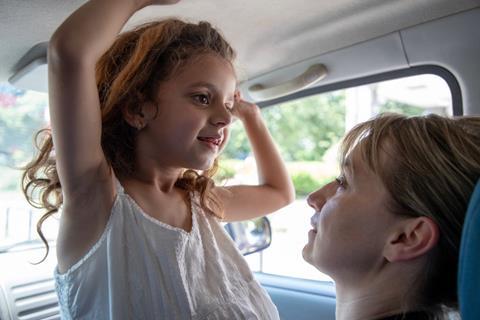Goran Stolevski delivers another triumph in this domestic story of marginalised people

Dir/scr: Goran Stolevski. North Macedonia/Poland/Croatia/Serbia/Kosovo. 2023. 107 mins.
Dita (Anamaria Marinca) never wanted to be anyone’s mother. Until, under duress, her terminally ill girlfriend Sauda (Alina Serban) extracts a promise that Dita will be a mum to her two daughters: sparky six-year-old live-wire Mia (Dzada Selim) and rebellious teenager Vanesa (Mia Mustafa). Not only that, but Sauda insists that Dita’s gay housemate Toni (Vladimir Tintor) is named as Vanesa’s father on her birth certificate. Tensions erupt in Dita’s already explosive Skopje household: her home is a chaotic safe house for a constant stream of outcasts and misfits. The latest film from Macedonia-born Australian director Goran Stolevski is a phenomenal achievement – an untamed, densely detailed drama that crackles with so much feral energy, you practically get a static shock from the screen.
Fresh, authentic and genuinely exciting
It’s a striking tonal contrast to the 2022 Sundance-premiering You Will Not Be Alone, Stolevski’s acclaimed debut, which used a lyrically Malick-like approach to tell the story of a shape-shifting witch in medieval Macedonia. Housekeeping, in contrast, is a rattling, eye-catching sensory assault, with something of the spirit of Kirill Mikhanovsky’s hectically compassionate Give Me Liberty. It’s a thrillingly accomplished third film – Stolevski’s sophomore picture, Of An Age, also premiered last year, at the Melbourne International Film Festival, before winning the $100,000 CinefestOz prize for Best Australian Film. And it seems a likely contender to feature on the international awards circuit in the coming year. Focus Features picked up US rights in advance of the film’s premiere in the Horizons section of the Venice Film Festival. Universal Pictures will handle international distribution, outside of Eastern Europe, a smilar arrangement to Alone.
Stolevski’s confident, distinctive voice as a filmmaker is evident from the outset. The film starts (and ends) not just abruptly, but as if it has been ripped from a moment in time. The audience is unceremoniously dumped into the living room of Dita’s cluttered home, where Mia and Vanesa are vigorously dancing with a peroxided stripling of a Roma boy named Ali (Samson Selim), the handheld camera bopping cheerfully between pogo-ing figures. We assume that they are old friends, but it becomes clear that Ali is a stranger – a casual hook-up invited home by Toni. That Mia and Vanesa so effortlessly take his presence in their stride suggests that the entire queer Roma community of Skopje has bunked on Dita’s sofa at one time or another.
Dita, ethnically Kosovar and thus not subject to the same discrimination as the Roma population, acts as an intermediary and advocate for the disenfranchised community that takes shelter in her home. This includes her partner Sauda, whose advanced cancer diagnosis hasn’t quenched her explosive rage at the casual racism directed at Roma like herself. It’s Dita’s cool head and ability to coexist between the Roma and the Kosovar communities that persuades Sauda that Dita is the right person to care for her girls after she is gone. Vanesa, however, violently rebels against the idea.
Family, Stolevski argues, is rocky terrain, whether it’s made up of blood relatives or of loved ones accumulated along the way. The churning tensions and layers of anxiety, the riotous humour and the hostility, the individual stories that play out simultaneously in every family: it’s all superbly captured in dinner table scenes full of swearily affectionate confrontations and show-off pre-teen prancing courtesy of Mia. It’s a room perpetually full of joy and laughter and noise, but in the corner of the frame is a heartbroken Dita, scouring the internet for miracle cancer cures, in the hope of staving off the death sentence handed to Sauda along with her diagnosis.
Stolevski’s handling of the balance between jostling high spirits and the creeping dread of loss is supremely confident; his storytelling is fresh, authentic and genuinely exciting.
Production companies: List Production, Madants, Kinorama, Sense Production, Industria Film
International sales: New Europe Film Sales jan@neweuropefilmsales.com
Producer: Marija Dimitrova, Klaudia Smieja-Rostworowska, Ankica Juric Tilic, Beata Rzezniczek, Milan Stojanovic, Blerta Basholli
Cinematography: Naum Doksevski
Editing: Goran Stolevski
Production design: Anna Rzezniczek
Music:Alen Sinkauz, Nenad Sinkauz
Main cast: Anamaria Marinca, Alina Serban, Samson Selim, Vladimir Tintor, Dzada Selim, Mia Mustafa, Sara Klimoska, Rozafa Celaj, Ajshe Useini






![The Brightest SunScreen[Courtesy HKIFF]](https://d1nslcd7m2225b.cloudfront.net/Pictures/274x183/3/5/0/1448350_thebrightestsunscreencourtesyhkiff_312678.jpg)














![The Brightest SunScreen[Courtesy HKIFF]](https://d1nslcd7m2225b.cloudfront.net/Pictures/100x67/3/5/0/1448350_thebrightestsunscreencourtesyhkiff_312678.jpg)


